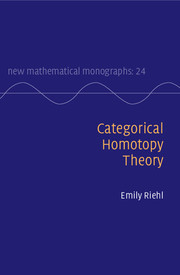Book contents
- Frontmatter
- Dedication
- Contents
- Preface
- PART I DERIVED FUNCTORS AND HOMOTOPY (CO)LIMITS
- PART II ENRICHED HOMOTOPY THEORY
- PART III MODEL CATEGORIES AND WEAK FACTORIZATION SYSTEMS
- 11 Weak factorization systems in model categories
- 12 Algebraic perspectives on the small object argument
- 13 Enriched factorizations and enriched lifting properties
- 14 A brief tour of Reedy category theory
- PART IV QUASI-CATEGORIES
- Bibliography
- Glossary of Notation
- Index
12 - Algebraic perspectives on the small object argument
from PART III - MODEL CATEGORIES AND WEAK FACTORIZATION SYSTEMS
Published online by Cambridge University Press: 05 June 2014
- Frontmatter
- Dedication
- Contents
- Preface
- PART I DERIVED FUNCTORS AND HOMOTOPY (CO)LIMITS
- PART II ENRICHED HOMOTOPY THEORY
- PART III MODEL CATEGORIES AND WEAK FACTORIZATION SYSTEMS
- 11 Weak factorization systems in model categories
- 12 Algebraic perspectives on the small object argument
- 13 Enriched factorizations and enriched lifting properties
- 14 A brief tour of Reedy category theory
- PART IV QUASI-CATEGORIES
- Bibliography
- Glossary of Notation
- Index
Summary
The modern definition of a model category typically asks that the factorizations are functorial, and for good reason: the construction of derived functors of Quillen functors described in Chapter 2 requires a functorial cofibrant and fibrant replacement, which come for free with functorial factorizations. Depending on which examples of model categories you have in mind, this functoriality hypothesis can seem restrictive. For example, it is fairly clear how to replace a chain complex of abelian groups by a quasi-isomorphic chain complex of free abelian groups, defining a cofibrant replacement for a model structure on Ch≥0(ℤ), but the naïve method of doing so is not functorial. Fortunately, there is a general argument, due to Quillen, that saves the day in many cases.
The small object argument, introduced by Quillen to construct factorizations for his model structure on Top [65, §II.3], is well treated in a number of sources [24, 36, 38, 58]. We review this construction in Section 12.2, but our focus here is somewhat different. We present a number of insights that we expect will be new to most homotopy theorists deriving from recent work of Richard Garner – the “algebraic perspectives” mentioned in the title. To whet the reader's appetite, we briefly mention one corollary: a principle for recognizing when a map constructed as a generic colimit, such as a coequalizer, of a diagram of cofibrations is again a cofibration, despite the quotienting (see Lemma 12.6.13).
- Type
- Chapter
- Information
- Categorical Homotopy Theory , pp. 190 - 221Publisher: Cambridge University PressPrint publication year: 2014



